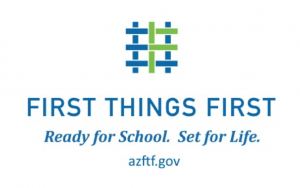By Cynthia Pardo • First Things First
 FLAGSTAFF – As we enter the Thanksgiving season, it is the perfect time to teach young children a very important life lesson: gratitude.
FLAGSTAFF – As we enter the Thanksgiving season, it is the perfect time to teach young children a very important life lesson: gratitude.
Barbara Lewis, author of What Do You Stand For? For Kids, says children as young as 2 are aware that other people do things for them or give them things that make them happy. As children grow, this awareness turns into an understanding of higher concepts, such as kindness and caring. As they mature further, they will learn to empathize and appreciate the feelings of others – crucial skills for all adults.
“Parents say learning from a place of gratitude is innately joyful, and cultivates compassion and deep awareness,” said Pearl Rawls, parent educator with the Flagstaff Parents as Teachers Program, which is funded by the First Things First Coconino Region.
Flagstaff mom, Jennifer Williams, has found that gratitude is an invaluable trait that she sees developing in her 2-year-old son Joseph. Williams and her toddler have been learning and growing through the PAT program. When Williams voluntarily signed up for the program about a year and half ago, she began receiving monthly visits where Rawls would talk with her about her son’s health and development, provide developmental screenings and share parenting techniques and learning tools like books and toys.
Through the program, they also talk about how critical the social and behavioral skills like gratitude, motivation, self-discipline, focus and self-esteem, are for learning and how these skills are take root from birth to five years old.
For little Joseph, helping to build a strong foundation for learning means that he is more likely to be successful in school and in life.
The first five years offer the opportunity for children to develop the skills they need to be successful students and successful adults. Research shows that thankful people are usually more optimistic and are less depressed and stressed. So, teaching children to appreciate what they have – and what others do for them – helps them to become happier, healthier adults.
“Saying ‘thank you’ is only a small part of teaching gratitude,” Rawls said. “When we respect and love our children, celebrate their accomplishments, teach them to connect to and communicate their emotions, along with demonstrating our own gratitude every day, they gain a deeper understanding of gratefulness and can share it with the world.”
So, how do we teach our children to be grateful and develop these essential social and behavioral skills? Here are some tips from First Things First, gathered from child development experts and websites:
- Teach children to say thank you to everyone who does something for them– their server at a restaurant, the older sibling who helps them pick up toys, or the friend who buys them a birthday gift.
- Talk about the things you are grateful for.This can be everything from a blessing before dinner to reciting evening prayers.
- Involve kids in chores at home.Nothing makes children appreciate the time and effort that goes in to different activities like doing the work themselves.
- Support a charitable event or organization.Whether you are donating old clothes or toys, participating in a food drive, or even baking cookies for a new neighbor, talk to children about what those actions means to those who receive the kindness.
- Say no.It’s hard to teach gratitude to someone who gets everything they want.
- Be consistent.Like all skills, gratitude is not learned in one lesson.
The Parents as Teachers program gives parents the tools to realize they are their child’s first and best teacher. The program is currently enrolling families with children 0-5 years old. For more information contact Pearl Rawls at 928-522-3734.
About First Things First – First Things First is a voter-created, statewide organization that funds early education and health programs to help kids be successful once they enter kindergarten. Decisions about how those funds are spent are made by local councils staffed by community volunteers.
— For more tips to make every family moment a learning moment, visit azftf.gov.
